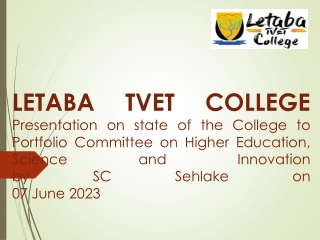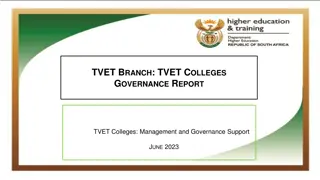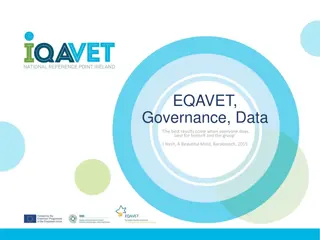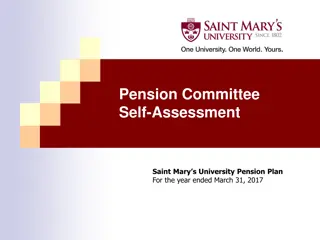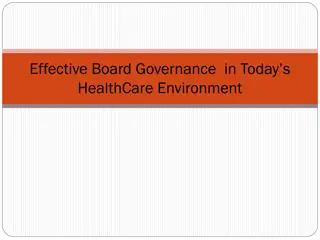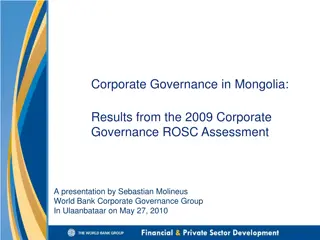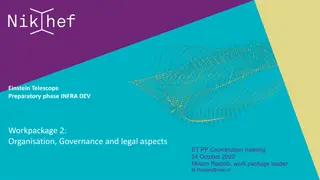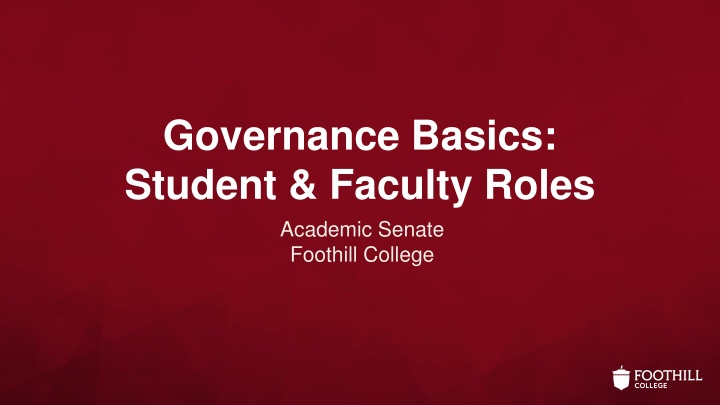
Shared Governance in Academic Institutions
Explore the concept of shared governance in academic institutions, focusing on the roles of students, faculty, and staff in decision-making processes. Learn how Title 5 regulations define responsibilities and the importance of collegial consultation and reasonable consideration in governance practices.
Download Presentation

Please find below an Image/Link to download the presentation.
The content on the website is provided AS IS for your information and personal use only. It may not be sold, licensed, or shared on other websites without obtaining consent from the author. If you encounter any issues during the download, it is possible that the publisher has removed the file from their server.
You are allowed to download the files provided on this website for personal or commercial use, subject to the condition that they are used lawfully. All files are the property of their respective owners.
The content on the website is provided AS IS for your information and personal use only. It may not be sold, licensed, or shared on other websites without obtaining consent from the author.
E N D
Presentation Transcript
Governance Basics: Student & Faculty Roles Academic Senate Foothill College 12345 El Monte Road Los Altos Hills, CA 94022 foothill.edu
Shared Governace What is meant by the term shared governance?
Answer Shared governance is not a term that appears in law or regulation. Education Code 70902(b)(7) 70902(b)(7) calls on the California Community Colleges Board of Governors to enact regulations to ensure faculty, staff, and students...the right to participate effectively in district and college governance and, further, to ensure the right of academic senates to assume primary responsibility for making recommendations in the areas of curriculum and academic standards. Education Code The intent of the legislature in enacting this section of AB 1725 (Vasconcellos, 1988) was to authorize more responsibility for faculty members in duties that are incidental to their primary professional duties and to assure that increased faculty involvement in institutional governance and decision making does not conflict with faculty rights in collective bargaining (Section 4n). This shared involvement in the decision-making process does not necessarily imply total agreement, nor does it abrogate the ultimate decision-making responsibility of the local governing board.
Answer Continued: What is meant by the term shared governance? Title 5 51023.7 and 51023.5 state requirements for the effective participation of students and staff, respectively, in the development of recommendations to the governing board. Title 5 53203 requires the governing board to consult collegially with the academic senate on academic and professional matters as defined in 53200. Consequently, the more precise terms call for the governing board to assure effective participation of students and staff and to consult collegially with academic senates. The term shared governance can take on many meanings, and thus its use may better be curtailed in favor of the more precise terms.
Title 5 Regulations defines roles/responsibilities for students, faculty, and classified staff Faculty (Title 5 53200) The areas of Academic and Professional Matters (the 10+1 ) Consult Collegially (Mutually Agree or Rely Primarily Upon) Students (Title 5 51023.7) The areas that have or will have a significant effect on students (the 9+1 ) Reasonable consideration to recommendations Staff (Title 5 51023.5) opportunity to participate effectively in district and college governance
Collegial Consultation vs. Reasonable Consideration Collegial Consultation - Title 5 53200(d) Consult collegially means that the district governing board shall develop policies on academic and professional matters through either or both of the following methods, according to its own discretion: (1) relying primarily upon the advice and judgment of the academic senate; or (2) agreeing that the district governing board, or such representatives as it may designate, and the representatives of the academic senate shall have the obligation to reach mutual agreement by written resolution, regulation, or policy of the governing board effectuating such recommendations. Reasonable Consideration Title 5 51023.7(c) The governing board shall give reasonable consideration to recommendations and positions developed by students regarding district and college policies and procedures pertaining to the hiring and evaluation of faculty, administration, and staff.
Role of the Academic Senate Title 5 53200 Definitions The 10+1 Academic and professional matters means the following policy development and implementation matters: Curriculum, including establishing prerequisites and placing courses within disciplines; Degree and certificate requirements; Grading policies; Educational program development; Standards or policies regarding student preparation and success; District and college governance structures, as related to faculty roles; Faculty roles and involvement in accreditation processes, including self-study and annual reports; Policies for faculty professional development activities; Processes for program review; Processes for institutional planning and budget development; and Other academic and professional matters as are mutually agreed upon between the governing board and the academic senate. 1) 2) 3) 4) 5) 6) 7) 8) 9) 10) 11)
BP 2223: Role of the Academic Senate in Academic and Professional Matters AREA JOINT PRIMARY RELIANCE DEVELOPMENT 1. Curriculum X 2. Degree and Certificate Requirements: General Ed. and Program Specific X Units for Degree X 3. Grading Policies X 4. Educational Program Development X 5. Standards Regarding Student Preparation and Success X 6. Governance Structures as Related to Faculty Roles X 7. Faculty Involvement in Accreditation X 8. Policies for Faculty Professional Development Activities (Other Than Contractual Aspects) X 9. Policies for Program Review X 12345 El Monte Road Los Altos Hills, CA 94022 10. Processes for Institutional Planning and Budget Development X 11. Other Academic and Professional Issues: Whether primary reliance or joint development to be determined on an individual basis by the Board or its designee. foothill.edu
Participatory Governance What is participatory governance?
Education Code Sections 70901 - 70902 Board of Governors shall establish "minimum standards" and local governing boards shall "establish procedures not inconsistent" with those standards to ensure: faculty, staff, and students the right to participate effectively in district and college governance, and the opportunity to express their opinions at the campus level and to ensure that these opinions are given every reasonable consideration, and the right of academic senates to assume primary responsibility for making recommendations in the areas of curriculum and academic standards. areas of curriculum and academic standards
Students 9+1 Rights (Title 5 51023.7) Significant Effect on Students - The 9+1 1. Grading Policies 2. Codes of Student Conduct 3. Academic disciplinary policies 4. Curriculum development 5. Courses or programs which should be initiated or discontinued 6. Processes for institutional planning and budget development 7. Standards and policies regarding student preparation and success 8. Student services planning and development 9. Student fees within the authority of the district to adopt + 1 in student rights is meant to account for anything else that your college or district thinks will have a significant impact on students
Principles of Participatory Governance Transparency and Accountability Participatory governance revolves around transparency in decision-making processes and accountability to all stakeholders. Collaborative Decision-Making Emphasizing collaboration and consensus-building, participatory governance encourages collective problem-solving and decision-making. Inclusive Representation Ensuring that all groups within the institution are represented in the governance structure is fundamental to the principles of participatory governance.
Participatory Governance:Student Rights 9 + 1 Role of Student Governments The primary representative of the student body population in decisions and matters of concern regarding academic standards and policies on campuses Advocacy for positive change through interaction with students, faculty, administrators, and staff Engagement and empowerment of the student voice in the community Managing Campus Culture, Health and Wellness, Sustainability and the Drafting and Pursuance of Initiatives
ASCCCs Mission As the official voice of California community college faculty in academic and professional matters, the Academic Senate for California Community Colleges (ASCCC) is committed to advancing inclusion, diversity, equity, anti-racism, accessibility, student learning, and student success. The ASCCC acts to: Empower faculty to engage in local and statewide dialogue and take action for continued improvement of teaching, learning, and faculty participation in governance Lead and advocate proactively for the development of policies, processes, and practices Include diverse faculty, perspectives, and experiences that represent our student populations Develop faculty as local and statewide leaders through personal and professional development Engage faculty and system partners through collegial consultation
Faculty Academic Senates and Student Governments Partnerships Locally, identify areas of shared interest. Possibly set shared goals. Student Government and Academic Senate leadership meetings/regular dialogue (Alert each other of concerns) Share intentions, gather information, request support or collaboration as needed sounding board Attend each other s meetings (consider a formal liaison) Mentoring professional development for the student governments Onboarding processes Student assigned to committee, how are they introduced and supported as a new member? Overall college governance process
Benefits of Collaboration Partnering with student government on shared areas or purview can strengthen recommendations to the college or district office. Joint resolutions can provide a powerful statement of unity and collaboration.
Resources Scenarios to Illustrate Effective Participation in District and College Governance - PDF Participating Effectively in District and College Governance Paper- PDF Send Questions to ASCCC info email: info@asccc.org SSCCC Website studentsenate@ccc.org ASCCC website: https://www.asccc.org ASCCC Committees and Task Forces: https://www.asccc.org/communities/committees ASCCC Inclusivity Statement: https://asccc.org/inclusivity-statement ASCCC Mission and Vision: https://asccc.org/about/mission

